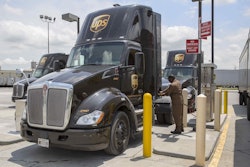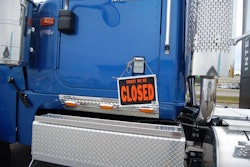Trucking news and briefs for Wednesday, June 16, 2021:
Automatic emergency braking, Clearinghouse revisions on DOT's regulatory radar
Automatic emergency braking, Drug and Alcohol Clearinghouse revisions, a revision to the vision standard for drivers and more are among a bevy of rules the U.S. Department of Transportation plans to work on over the next year and beyond.
In the DOT’s portion of the Biden administration’s Unified Agenda, the department listed the rules it views as a priority in the near future. The Federal Motor Carrier Safety Administration has seven rules listed in the proposed rule stage and 12 rules listed in the final rule stage. The National Highway Traffic Safety Administration also has three rules in the works that affect commercial vehicles.
Most notable among FMCSA’s list of rules is a proposed rule that would revise the Drug and Alcohol Clearinghouse, which went into effect at the beginning of 2020. According to the abstract listed with the rule, the proposal would “streamline and improve error-correction procedures, queries and consent requirements.” As of right now, the notice of proposed rulemaking is expected in February 2022.
FMCSA is also looking at finalizing a rule that would revise the vision standard for drivers. The agency published a notice of proposed rulemaking in January 2021, which proposed to allow drivers who cannot meet either the current distant visual acuity or field of vision standard, or both, in one eye to be physically qualified to operate a commercial vehicle. A final rule is expected to be published in February 2022.
From NHTSA, a proposed rulemaking that would require automatic emergency braking to become standard on heavy trucks is expected to be published in April 2022. If the current version of the House of Representatives' infrastructure bill, the INVEST in America Act, were to come law, the move to standardizing and requiring AEB technology would be required of the agency.
NHTSA agency also plans to propose fuel efficiency and greenhouse gas standards for medium- and heavy-duty trucks next year and to finalize a rule for upgrading rear impact guard requirements for trailers.
Other notable rules in the works from FMCSA include:
- Broker and freight forwarder financial responsibility (an advanced notice of proposed rulemaking was previously published in 2018)
- Safe integration of automated driving systems (an ANPRM was previously published in 2019)
- Hazmat vehicles and railroad highway grade crossings
- Certification of safety auditors, investigators and inspectors (a notice of proposed rulemaking was published in 2019)
Bridgestone invests in autonomous long-haul trucking tech firm
Bridgestone Americas announced Wednesday it has made a minority investment in Kodiak Robotics, a U.S.-based self-driving trucking company.
The partnership will allow Bridgestone to integrate its smart-sensing tire technologies and fleet services into Kodiak’s level 4 autonomous trucks. The companies will also pilot future autonomous and smart tire technologies to further enhance vehicle intelligence and advance toward a safer, more efficient, and more sustainable mobility future.
“Automated vehicles offer a number of benefits to commercial fleet customers and society, including safer roads with fewer unexpected incidents, and upwards of 20% savings in fuel and efficiency,” said Paolo Ferrari, Global Chief Solutions Officer, Bridgestone Corporation, and President & CEO, Bridgestone Americas. “Advancements in tire-centric technologies are critical to unlocking greater innovation in mobility, while also delivering significant sustainability benefits. This investment will enable Bridgestone and Kodiak to work together to co-develop advanced mobility solutions with speed and precision that will revolutionize commercial trucking.”
Kodiak moves freight autonomously for its customers using its fleet of level 4 self-driving long-haul trucks in Texas with a safety driver on board.
Bridgestone’s suite of cloud-based technologies leverage connected vehicle data to help predict tire health and maintenance, as well as optimize tire lifespan. Additionally, Bridgestone’s vehicle platform technologies provide tire intelligence to vehicle safety and autonomous systems to tune their performance and drive safer outcomes. Together, Kodiak and Bridgestone will be able to link vehicle-based and smart-sensing tire technologies to improve vehicle safety, fleet efficiency, and the next generation of autonomous trucking solutions.
Regional parcel delivery service expanding in five states
Lone Star Overnight (LSO), a regional parcel delivery service company serving Texas and Oklahoma, announced plans to expand its footprint for e-commerce/ground parcel delivery into five additional states in early September.
The expanded five-state coverage service will include Louisiana, Arkansas, Missouri, the Missouri and Illinois side of the St. Louis metropolitan area, and the Missouri and Kansas side of the Kansas City metropolitan area. Together, these two large markets include nearly 90% of the population and e-commerce deliveries in Missouri.
In Louisiana, LSO already serves the Shreveport and Lake Charles metropolitan areas and will add most of southern Louisiana areas along the I-10 corridor to include New Orleans, Baton Rouge, Lafayette, Houma, Hammond, and other cities in that part of the state. LSO will serve nearly 75% of the Louisiana population.
In Arkansas, the expanded coverage will include the Little Rock/Conway metropolitan area, as well as Northwest Arkansas to include Fayetteville, Springdale, Rogers and other nearby areas.
"Our geographic coverage has not changed much over the last 30 years, but our e-commerce and business customers have been strongly encouraging us to expand our service area,” said LSO CEO Richard Metzler. “The drumbeat is louder and louder from our clients who are desperate to reduce their dependence on the major shipping companies. Some even have C-Level mandates to do so after what they experienced in Peak 2020, so far this year, and what they have been told about Peak 2021. It appears that they have lost the trust of some of the biggest shippers in the country.”
Alabama added to Bestpass tolls network
Toll management system Bestpass is expanding its nationwide toll coverage network to Alabama through a partnership with American Roads.
Bestpass will offer its customers Alabama coverage on the Tuscaloosa Bypass, Foley Beach Express, Emerald Mountain Express and Montgomery Express through its 6C protocol toll transponders. All four bridges are owned and operated by American Roads.
In September 2019, Bestpass announced that it had reached an agreement to register its 6C transponders with the Transportation Corridor Agencies for use by commercial fleets on The Toll Roads in Orange County, California. Bestpass offers a variety of national and regional transponder and coverage options for its commercial fleet customers, which operate hundreds of thousands of vehicles across North America.
“The emerging 6C protocol allowed us to provide our customers with toll interoperability throughout California, and this partnership with American Roads allows us to expand our 6C coverage to Alabama,” said John Andrews, president and chief strategy officer for Bestpass. “We work with all toll protocols to ensure that our customers have the best possible toll management program, including our Complete Pass Scout device, which offers coast-to-coast coverage.”










